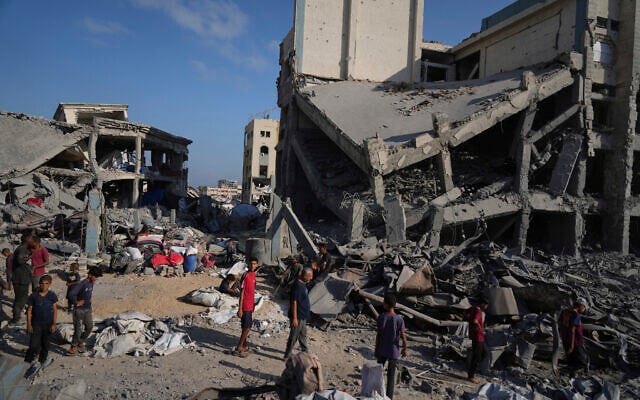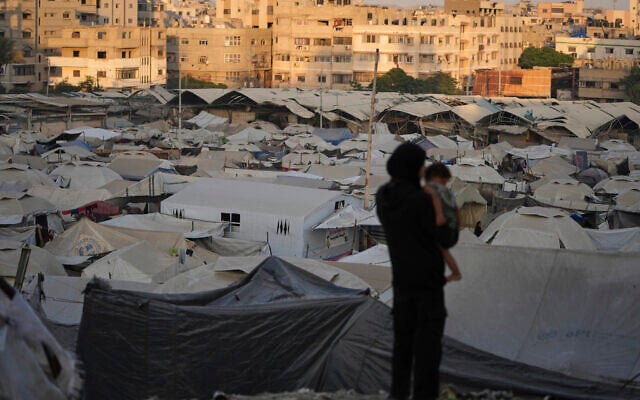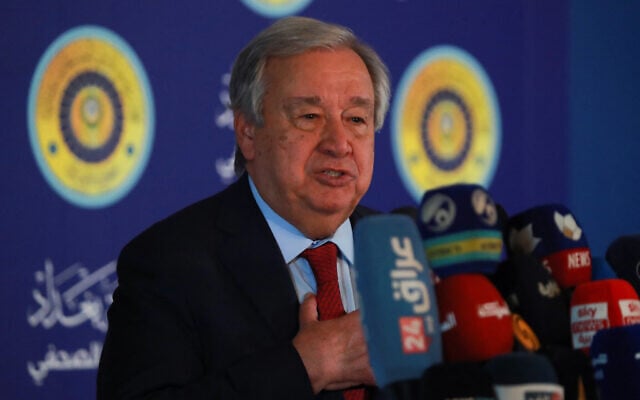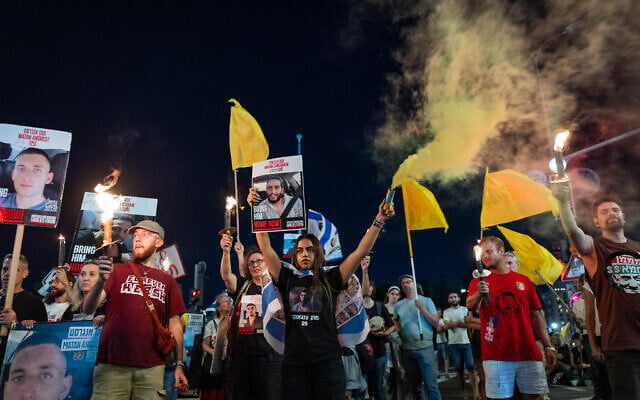Israel’s plan to “take control” of Gaza City as approved by Prime Minister Benjamin Netanyahu’s security cabinet touched off a wave of criticism Friday from both inside and outside the country.
Nations around the world condemned the plan, saying it would only worsen the conflict and lead to more bloodshed.
The United Nations Security Council was to meet in a rare weekend session on Saturday to discuss Israel’s decision, three diplomatic sources told AFP.
United Nations Secretary-General Antonio Guterres called the Israeli plan a “dangerous escalation” that risks “deepening the already catastrophic consequences for millions of Palestinians”.
“The Israeli government’s decision to further extend its military operation in Gaza must be reconsidered,” European Commission chief Ursula von der Leyen said on X. She called for a ceasefire, the release of all hostages and “immediate and unhindered access” for humanitarian aid in Gaza.
European Council president Antonio Costa warned that “such a decision must have consequences” for EU-Israel ties. “The situation in Gaza remains dramatic, and the decision by the Israeli government will only further worsen it,” he posted on X.
Dutch Foreign Minister Caspar Veldkamp told Axios’s Barak Ravid: “Netanyahu’s cabinet is losing Europe — totally. We stand with Israel, but not with the policy of the Israeli government.”

In Hamas’s backer Iran, foreign ministry spokesman Esmaeil Baqaei said Israel’s plan was “another clear sign of the Zionist regime’s specific intention to ethnically cleanse Gaza and commit genocide against the Palestinians.”
In China, a foreign ministry spokesperson told AFP, “Gaza belongs to the Palestinian people and is an inseparable part of Palestinian territory. The correct way to ease the humanitarian crisis in Gaza and to secure the release of hostages is an immediate ceasefire.”
German Chancellor Friedrich Merz said it was “increasingly difficult to understand” how the Israeli military plan would help achieve legitimate aims. “Under these circumstances, the German government will not authorize any exports of military equipment that could be used in the Gaza Strip until further notice,” he added.
In the UK, Prime Minister Keir Starmer said, “This action will do nothing to bring an end to this conflict or to help secure the release of the hostages,” adding that it would “only bring more bloodshed.”
France’s foreign ministry said the planned operation “would constitute further serious violations of international law and lead to a complete dead end,” while Canada’s Prime Minister Mark Carney said: “We join many others in viewing that this is wrong, that this action is not going to contribute to an improvement in the humanitarian situation on the ground.”

The foreign ministers of Australia, Germany, Italy, New Zealand, and the United Kingdom said in a joint statement that “the plans that the Government of Israel has announced risk violating international humanitarian law.”
Qatar said Doha views the decision as “a dangerous development that threatens to exacerbate the humanitarian suffering resulting from the ongoing war in the Strip, exacerbates its disastrous repercussions and undermines efforts aimed at achieving a permanent ceasefire.” The United Arab Emirates called on the international community “to fulfill their responsibilities and put an end to such illegal practices in contravention of international law.”
The UNSC meeting at 19:00 GMT Saturday was requested by several members of the Security Council, a member of the Council told AFP, as global concern mounted over Israel’s plan.
Riyad Mansour, the Palestinian Authority’s UN envoy, also said earlier in the day that a number of countries would be requesting a meeting at the Security Council to discuss Israel’s plans, which were approved in a Thursday overnight cabinet session.
The Security Council session is unlikely to produce any resolution or even statement, despite the widespread international opposition to the Israeli plan, as the US would be certain to block such initiatives.
The Gaza City takeover, which was authorized despite the military’s opposition, has sparked fierce criticism at home and abroad, with hostage families saying it will endanger their loved ones and foreign governments warning of dire consequences for Gaza’s civilians.

The UN and other aid agencies have reported skyrocketing cases of malnutrition in Gaza. Israel has blamed the crisis on the UN and Hamas, both of whom it accuses of impeding aid deliveries.
Gaza City takeover plans enrage families of captives
The plan’s limitation of the IDF takeover to Gaza City did not seem to go as far as what had earlier been characterized as a plan to occupy the entirety of the Strip. Netanyahu told Fox News hours before the security cabinet convened that a full takeover was his intention.
However, a statement from Netanyahu’s office notably described the adopted proposal as one aimed at “defeating Hamas,” meaning that there may be subsequent operations beyond the one for Gaza City that were approved and not announced.
The decision did not use the word “occupy,” and instead referred to “taking over,” due to legal reasons pertaining to Israel’s responsibility for civilian matters in Gaza, according to the Ynet news site. The outlet added, however, citing an unnamed senior Israeli official, that this distinction was superficial, and the decision in fact relates to full military rule. The conquest would stop if a hostage deal is clinched, according to the report.
Roughly one million Palestinians — many of whom have already been displaced several times throughout the 22-month war — currently reside in Gaza City, in northern Gaza. A senior Israeli official told The Times of Israel news that the plan approved by the cabinet will see those civilians evacuated toward the south.
The cabinet decision states that Palestinians will have until October 7, 2025, to evacuate Gaza City — a two-month window that also coincides with the second anniversary of Hamas’s attack on Israel, the Israeli official said. The IDF will then launch its ground offensive into Gaza City, placing a siege on the area in order to kill any remaining Hamas operatives. After the takeover is complete, the official indicated that the IDF will proceed to the remaining unconquered areas of Gaza.
Israel says it currently controls 75 percent of the Strip, while the IDF has largely avoided entering the remaining 25% — which mostly comprises Gaza City and refugee camps in central Gaza — due to the belief that most of the hostages are being held there. Almost all of Gaza’s 2 million citizens are currently in the quarter of the Strip that the IDF does not control. Hamas has threatened to execute hostages if its operatives detect Israeli troops closing in; Hamas captors killed six Israeli hostages in Rafah, in southern Gaza, last August, when IDF troops inadvertently neared the tunnel where they were being held.
Hostage families, who demand the government end the war and reach a comprehensive hostage deal, staged fiery protests in Tel Aviv and Jerusalem Thursday night as the cabinet convened to discuss the Gaza plans.
They argue that the last five months have proven that military pressure has not led Hamas to release the hostages and that Israel is in a position to agree to Hamas’s demand to end the war, as the terror group no longer poses a strategic threat to Israel.
Hamas has fully transitioned to fighting as a guerrilla group, causing roughly three dozen Israeli casualties since Israel broke the ceasefire in March by launching Operation Gideon’s Chariots, which was also aimed at securing the release of the hostages and defeating Hamas.

Netanyahu argues that ending the war and withdrawing from Gaza, as Hamas demands, will allow Hamas to regroup.
In the meantime, Netanyahu has rejected any post-war governing role in Gaza for the Ramallah-based Palestinian Authority, and otherwise refused to advance a viable governing alternative to Hamas.
The premier’s critics say this has allowed the war to drag out endlessly as Hamas has managed to remain the most dominant Palestinian force in Gaza. For his part, Netanyahu has argued that no alternative to Hamas will be able to survive in Gaza before the terror group has been defeated.
Netanyahu’s government also relies on far-right coalition partners who oppose a hostage deal and want to permanently occupy the Strip, push out its residents and re-establish settlements in their place.

